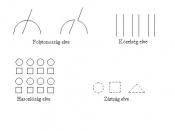There are 10 different perspectives of early psychology. I will be focusing on three: Gestalt psychology, psychodynamic, and cognitive. Here is a summary of each.
Gestalt psychology: Belief that the whole (Gestalt) is more than the sum of the parts, particularly in human behavior. For example the brain "sees" the rapid presentation of photographs as cinematographic motion, a musical piece is more than just collection of notes. The Gestalt school arose from researchers like Max Wertheimer, Kurt Koffka and Wolfgang Kohler just before WWI, countering the Victorian notion that the universe was just a collection of atoms and even complex human behavior was mere "conditioned reflexes". Gestalt theorists believe that the brain "adds" something to what it senses of the outside world. Since the 1950s Gestalt refers to a type of psychotherapy that assumes that separation of mind and body is artificial and that the human organism instead responds holistically to life events.
Humans are aware of and accurately perceive themselves, their needs and the world.
Cognitive: The word cognitive means of, or relating to mental activity such as thinking, remembering, learning, or using language. As you have guessed, cognitive perspectives examine development in terms of mental processing. The two major views within this perspective are cognitive developmental theory and information processing theory.
Cognitive Developmental Theory was advanced by Jean Piaget.. Piaget claims that cognitive thought develops in four qualitatively different stages. Each stage represents a different mode from which we view our world. Piaget's four stages are:
SENSORIMOTOR(Birth to 2 years)
PREOPERATIONAL(2 years to 7 years)
CONCRETE OPERATIONAL(7 years to 11 years)
FORMAL OPERATIONAL(11 years +)
The Information Processing Theory was advanced by Atkinson and Shiffrin. The IP theorists claim that our cognitive processes are like that of a computer. Here is an example to help you better...


